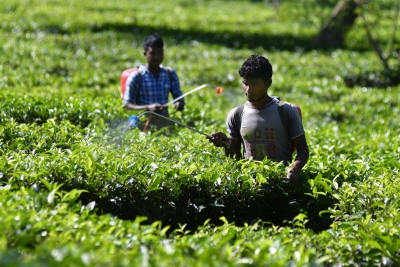Natural farming programme in AP halves use of pesticides, says study
By IANS | Published: April 7, 2022 07:54 PM2022-04-07T19:54:06+5:302022-04-07T20:05:07+5:30
New Delhi, April 7 Reorienting the farmers to natural farming methods has halved the use of synthetic and ...

Natural farming programme in AP halves use of pesticides, says study
New Delhi, April 7 Reorienting the farmers to natural farming methods has halved the use of synthetic and harmful chemicals in farming, thereby generating health, environmental and economic benefits, a study about farmers in Andhra Pradesh published on Thursday has said.
The study - a scientific evaluation published in the Lancet Planetary Health - is the first to evaluate the impact of a large-scale government organic agriculture programme on pesticide use and availability.
The key findings of the study show that the Andhra Pradesh Community-managed Natural Farming (APCNF), after a median of two years, was substantially less likely to report using synthetic chemicals and pesticides compared to conventional farmers.
A support programme which enabled farmers who used natural methods who had frequent interactions with agricultural extension workers, either government community resource persons (CRPs/iCRPs) or NGOs more frequently were less likely to use pesticides and adopt natural farming methods.
Frequent and sustained state-led training of farmers in organic farming practices can substantially reduce the use of harmful chemicals, which is detrimental to the environment and human health, it found out.
Collaborators from the Public Health Foundation of India, the Centre for Chronic Disease Control, India, the Harvard TH Chan School of Public Health, US, and the University of Edinburgh, UK supported by the Scottish Funding Council and UK Research and Innovation conducted the study in Andhra Pradesh with the APCNF.
"Our findings suggest that APCNF farmers still used pesticides on some part of their lands. Hence, a multifaceted approach combining farmer and retailer education, increased support to natural farming and limiting the availability of harmful chemicals will help the state of Andhra Pradesh to achieve its goal of 100 per cent natural farming by 2030," senior research scientist at Public Health Foundation of India, Nikhil Srinivasapura Venkateshmurthy, said.
Incidentally, interviews with more than 850 farmers and almost 40 retailers showed that despite the major government drive towards organic agriculture, about half of organic farmers still used pesticides and there had been no impact on pesticide sales at local retailers.
Lindsay Jaacks, Global Academy of Agriculture and Food Security, said: "We did not expect pesticides to drop to zero within just a couple years of the programme - a transition from input-heavy convention farming to organic does not happen overnight. APCNF farmers are less likely to use pesticides after about two years. The primary reason reported by APCNF farmers for decreasing their pesticide use over the past four years was personal health."
The researchers sought to assess the impact of the APCNF programme, which aims to transition eight million hectares of farmland, belonging to six million farmers, to organic by the end of the decade.
Disclaimer: This post has been auto-published from an agency feed without any modifications to the text and has not been reviewed by an editor
Open in app